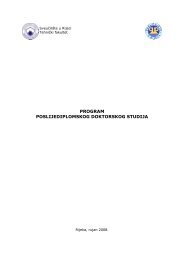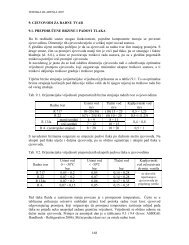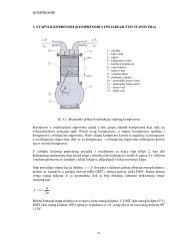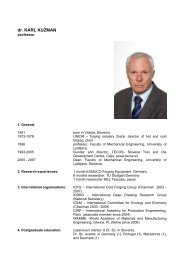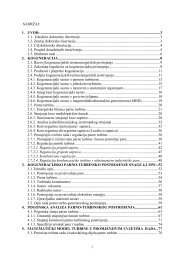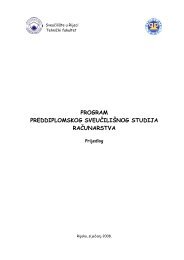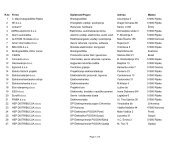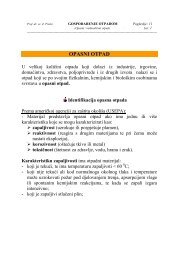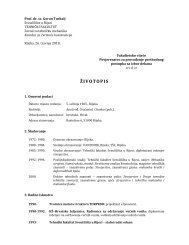universityâenterprise cooperation
universityâenterprise cooperation
universityâenterprise cooperation
You also want an ePaper? Increase the reach of your titles
YUMPU automatically turns print PDFs into web optimized ePapers that Google loves.
112<br />
participants (young and unemployed<br />
people, women, and internally displaced<br />
people) and enterprises (type of<br />
enterprise, type of training/service, type<br />
of distribution...);<br />
• Long-term planning of training and services<br />
distribution for various groups of users.<br />
Final goal of TSNA analysis is to determine<br />
knowledge and skills gaps, weaknesses and new<br />
competence requirements in regional enterprises,<br />
especially SMEs, and labor market. The<br />
company managers and persons engaged in<br />
product and service development, are constantly<br />
facing the question: Which knowledge should<br />
be developed to enhance competitiveness and<br />
efficiency of the company, and which are the<br />
particular fields of activities that the company<br />
should concentrate on? The answer is that it is<br />
not wise to create an ultimate list of required<br />
knowledge, skills and services. On the contrary,<br />
it is necessary to develop a system which will<br />
continuously monitor the changing needs of<br />
the company, analyse the results and provide<br />
feedback to a flexible and promptly responding<br />
environment which includes educational,<br />
training and consulting institutions.<br />
This tool is needed by both parties: the<br />
company managers and the training institutions<br />
providing education and new services.<br />
Continuing education, the delivery of noncredit<br />
or professional development courses<br />
to the community and to local industry, is<br />
an important element of the university’s<br />
service to the community. Having in mind<br />
that universities in the WB region have no recent<br />
experience in organization of Life-long<br />
learning (LLL) courses, it is very important to<br />
discuss the concept of establishment of the<br />
future Life-long Learning Centre at WBC.<br />
It is important to clear up that different<br />
types of vocational training will not replace<br />
academic programmes but will complement<br />
them by equipping graduates with the requisite<br />
employability and key skills. Universities should<br />
become aware that working in partnership<br />
with existing providers of training (i.e in soft<br />
skills) would contribute to bridge the gap and<br />
move to commercial training for SMEs.<br />
There will potentially be more work for<br />
Universities by providing short courses<br />
involving the underpinning knowledge<br />
required to complete a competence based<br />
on European Vocational Qualifications<br />
where there may be gaps in the individual’s<br />
experience or qualifications. There is a<br />
lot of space for the Universities in WBC<br />
to organize different trainings such as<br />
training in communication skills, IT abilities,<br />
team working and collaboration, problem<br />
solving abilities and taking responsibility<br />
for employees own continued professional<br />
development.<br />
The project WBC-VMnet has developed of an overall regional T&SNA system, with the objective to identify<br />
the following needs:<br />
• Company needs for advanced trainings and R/D services in the field of product and process development,<br />
applying innovative VM technologies,<br />
• The needs of the labour market, i.e. the unemployed who are registered at the national Employment<br />
Service (with the high school and university education) for specific trainings.<br />
The regional TSNA system includes the following:<br />
1. Analysis of the conditions in the companies (in particular sectors, which will be identified for each PC)<br />
through:<br />
• Analysis of the strategic goals of the company<br />
• Analysis of the organizational and innovative potentials<br />
• Assessment of their position at the domestic and international markets<br />
• Analysis of skills and knowledge of the employed in the project development sector<br />
• Analysis of posts occupied, i.e. the expected competencies of the employees occupying the posi<br />
tion, for further development of recommendations by the experts in this field.<br />
2. Research of the existing and required skills of the unemployed (university and high school degree),<br />
with the engagement of the National Employment Service, which will improve the balance between the<br />
offer and the requirements, and their successful employment.<br />
• Analysis of posts occupied, i.e. the expected competencies of the employees occupying the posi<br />
tion, for further development of recommendations by the experts in this field.



